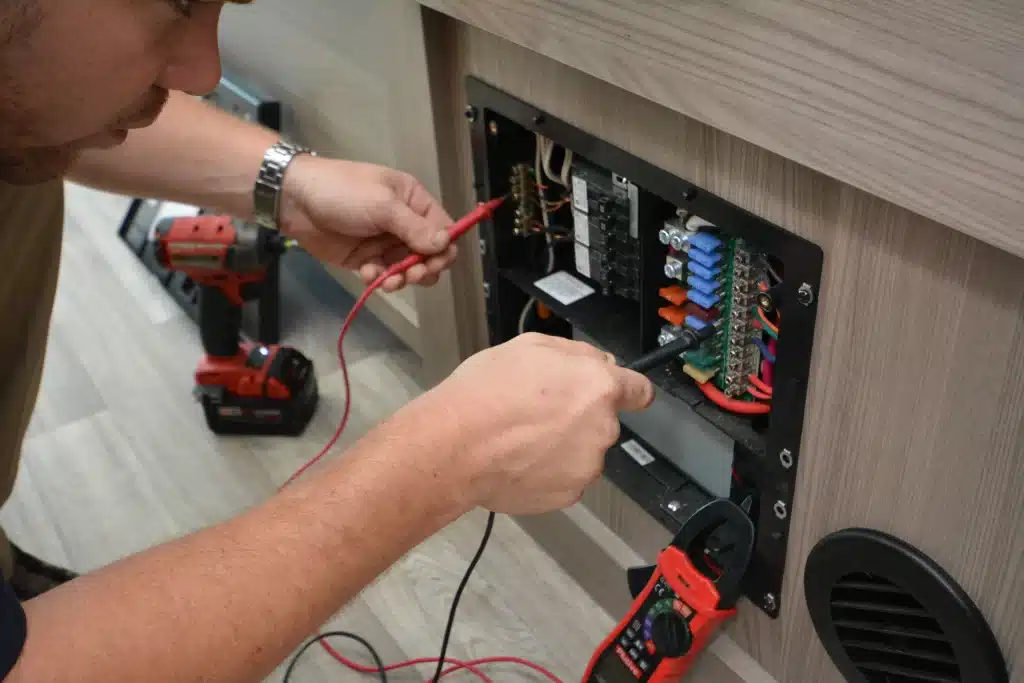Recreational Vehicles (RVs) provide the freedom to explore the open road, but like any vehicle or home, they require regular maintenance and repairs. From wear and tear to unexpected breakdowns, RV repairs can catch owners by surprise. Knowing what repairs to anticipate and how much they cost can help you avoid unwanted stress while keeping your RV in top condition.
1. Roof Leaks
RVs are constantly exposed to the elements, making roof leaks one of the most common and frustrating repairs. These leaks often result from cracked or aging seals around vents, skylights, or air conditioning units.
- Difficulty: Moderate
- Cost Range: $300 – $1,000 (depending on the extent of the damage)
- Pro Tip: Regular roof inspections can help prevent leaks. Applying a sealant at the first sign of wear can save you from costly water damage repairs.
Read more about preventing roof leaks from RV maintenance experts here.

2. Brake System Repairs
Your RV’s brake system is essential for safety, and its maintenance should never be overlooked. Over time, RV brakes can wear out, especially after long trips, hilly drives, or heavy loads.
- Difficulty: Advanced
- Cost Range: $300 – $1,500 (depending on parts and labor)
- Pro Tip: It’s best to leave brake repairs to professionals unless you’re well-versed in vehicle mechanics.
3. Slide-Out Malfunctions
RVs equipped with slide-outs offer expanded living space, but when they malfunction, they can become a major headache. These issues can result from motor failure, debris buildup, or alignment problems.
- Difficulty: Moderate
- Cost Range: $500 – $2,000
- Pro Tip: Regularly lubricating slide-out tracks and cleaning debris can prevent costly repairs down the line.
4. Air Conditioner Repairs
When the summer heat hits, a faulty air conditioning system can make your RV unbearably uncomfortable. RV air conditioners can experience issues ranging from refrigerant leaks to motor failures.
- Difficulty: Moderate to Advanced
- Cost Range: $500 – $2,000
- Pro Tip: Regularly cleaning the filters and inspecting the unit for signs of wear can prolong its lifespan.
5. Electrical System Failures
RVs have complex electrical systems, and problems can occur due to loose wiring, malfunctioning power inverters, or faulty circuit breakers. Electrical issues are not only inconvenient but also dangerous.
- Difficulty: Advanced
- Cost Range: $300 – $1,200 (depending on the specific issue)
- Pro Tip: Electrical repairs often require specialized knowledge. When in doubt, always seek professional help.
For more information on about electrical issues, click here.

6. Plumbing Problems
RV plumbing systems are often prone to leaks, especially in colder climates. Frozen pipes, faulty connections, or worn-out seals can cause water to leak into your RV’s interior.
- Difficulty: Moderate
- Cost Range: $100 – $500
- Pro Tip: Winterizing your RV properly before storing it in cold weather can help prevent many plumbing issues.

7. Tire Blowouts
Tire blowouts are not only common but can also be dangerous, especially when traveling at high speeds. Tire issues are often caused by underinflation, overloading, or worn-out treads.
- Difficulty: Easy to Moderate (for tire replacement)
- Cost Range: $200 – $800 per tire
- Pro Tip: Always check your tire pressure before a trip and replace tires once they show significant wear.
8. Battery Issues
RV batteries power essential systems, from lighting to appliances. Dead or malfunctioning batteries can prevent you from operating your RV and enjoying basic amenities on the road.
- Difficulty: Easy
- Cost Range: $100 – $400
- Pro Tip: Regularly check battery fluid levels and clean corrosion around the terminals to extend the life of your RV’s battery.
Conclusion
Understanding the most common RV repairs and how much they cost can help you prepare for the unexpected. With proper maintenance and timely repairs, you can keep your RV running smoothly and enjoy your travels without interruption.
It takes time and effort to plan your trips, you don’t want them disturbed by on the road or in camp RV problems. Remember that preventative maintenance is always saves money and time over reactive maintenance.
By anticipating common RV repairs and keeping up with routine maintenance, you’ll save both time and money in the long run. Safe travels!